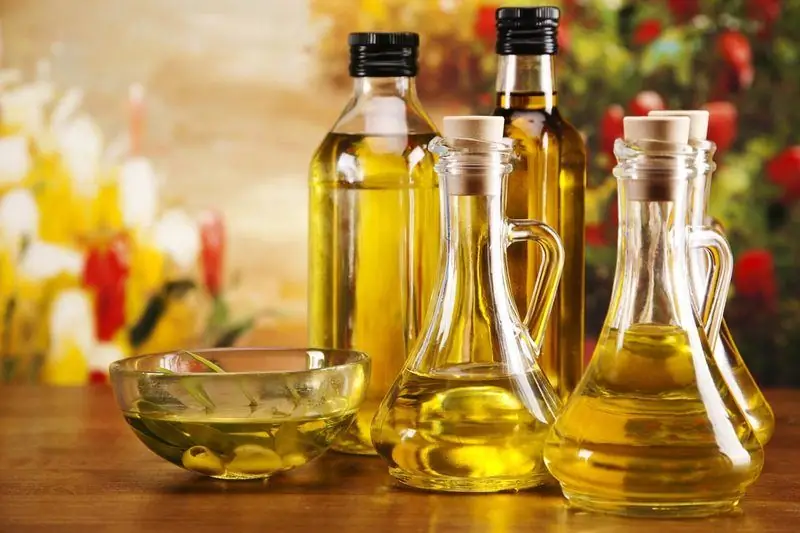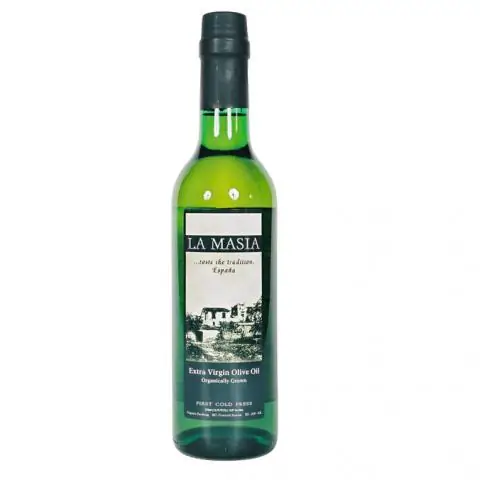
Table of contents:
- Author Bailey Albertson albertson@usefultipsdiy.com.
- Public 2023-12-17 12:53.
- Last modified 2025-01-23 12:41.
Why you can't fry in unrefined oil

The media often scares us with screaming articles about dangerous carcinogens and GMOs in food that cause irreversible mutations. Most often, such "sensations" are nothing more than a duck, but sometimes there is a completely solid foundation under them.
What is the difference from refined
Refined oil is a product that has gone through more stages of purification and processing. Such a product gets rid of:
- phospholipids (safe fatty compounds that can precipitate);
- free fatty acids (also safe);
- natural pigments that give the oil a rich yellow color;
- wax-containing elements (also safe for health), which are responsible for the transfer of taste and smell.
At the exit, we get a product with an attractive appearance (clean, not cloudy, without impurities and suspensions), but also practically without taste and smell. The main advantage of refined oil is the possibility of long storage.

Refined oil is most often found on store shelves - it is cheap, has a pale yellow color and has virtually no taste or smell
Crude oil myths
There are many common myths about the dangers of unrefined oil:
- it contains a lot of cholesterol. This is not true - the vegetable raw materials from which the product is made does not contain it at all. But unrefined oil contains phytosterol, and it lowers blood cholesterol;
- when frying, carcinogens are released. Wrong again. This is a completely natural product that does not contain terrible poisons and has been eaten by many peoples (especially Italians - remember the popular olive oil, on which chefs calmly fry dishes) for many centuries;
- it contains an excess of saturated fat. And again the opposite is true. Unrefined oil contains much more unsaturated (useful) fatty acids, as well as vitamins E, A, linoleic acid and other compounds;
- food burns in unrefined oil. This is only partly a myth. Food can burn if unrefined oil is heated too much. We will talk about how to use it correctly below.
Objective reasons not to fry in unrefined oil
Now we understand that when unrefined oil is heated, no dangerous carcinogens are released. So where does the advice not to fry in unprocessed oil come from? The only objective reason why you can refuse to fry in unrefined oil is the loss of useful properties by it when it reaches too high a temperature.
How to use unrefined oil properly
There is such a concept - "smoke point". This is the heating temperature at which the oil begins to emit smoke. In refined products, it is much higher, so they are used without fear for frying. For unrefined ones, it depends on raw materials:
- peanut butter can withstand temperatures up to 190 ° C well;
- olive begins to smoke when heated to 170-180 ° С;
- flaxseed withstands the same temperature range as olive;
- mustard oil starts to smoke at 160 ° C;
- sunflower is the most delicate, its "smoke point" is about 107 ° C.

The key to using unrefined oils is controlling heat treatment temperatures
Nutritionists and culinary experts recommend pouring just a little oil when frying, just enough so that the food does not burn. The rest can be added to the ready-made dish. Unrefined oil is best for simmering vegetables, making sauces, and all light to medium-cooked dishes.
Unrefined oil can be healthy and tasty if you know how to use it. Do not be afraid of myths, look for reliable information and discover the world of aromas of natural vegetable oils.
Recommended:
How To Choose The Right Olive Oil In The Store: Signs Of A High-quality Cold-pressed Product And Other Types + Photos And Videos

Olive oil is a valuable nutritious product. What benefits does it bring to the body? How to distinguish and choose the right olive oil in the store?
Why You Can't Why You Can't Wash Floors On Friday: Signs And Facts

Why you can't wash floors on Friday: signs and superstitions. The opinion of the mystics and Orthodoxy
Why You Can't Step On Graves In A Cemetery And What Will Happen If You Break The Ban

Why you can't step on graves in a cemetery: superstition, church opinion, and rational reasons
Which Oil Is Better: Refined Or Unrefined

Pros and cons of refined and unrefined oils. In the preparation of what dishes are they best used? Features of using different types of oils
Olive Oil Brands - Which Are Better, Reviews

Selection criteria for quality olive oil. TOP-12 olive oil producers
